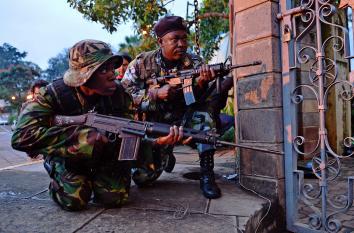Michelle Shephard of the Toronto Star reported this week on a document from al-Qaida’s East Africa group detailing plans for an attack on Britain.
The document was discovered on a flash drive found on the body of Fazul Abdullah Mohammed, a prominent al-Qaida leader killed in Somalia in 2011. Though the gruesome hypothetical attack was aimed at London’s Jewish community, diplomats, and business elites, the tactics appear somewhat reminiscent of this week’s assault on the Westgate Shopping mall in Nairobi, Kenya.
The document suggests a coordinated attack “similar to the tactics used by our brothers in Mumbai,” referring to the 2008 attack carried out by gunmen over the course of three days. The document suggests a team of gunmen “moving around the Golders Green,” a neighborhood known for its large Jewish community, “shooting random Jews while throwing petrol bombs into crowded places and groups.” Gunmen would also attack the prestigious Eton School on induction day to strike “a heavy blow at the ‘who’s who’ of the political and business world.”* After that, the Ritz or Dorchester hotels would be targeted by gunmen using petrol bombs, followed by the embassies of Uganda, Ethiopia, and Burundi—all countries involved in military operations in Somalia.
The document specifies that “each martyrdom seeker will be trained in Somalia preferably for 2 months and he will only know his mission. The men we plan to send back will not know any other mujahideen involved[,] only his own mission or they would be trained as a group depending on the type of operation they will carry.”
The Star’s article note that the Comoros-born Fazul, who was believed to be involved in both the 1998 embassy bombings in Kenya and Tanzania and the 2002 Mombassa hotel bombings, “had a somewhat fractured relationship with the Shabab,” whose leaders may have set him up for his killing by Somali security forces, but he was considered a commander in the group for a time.
Even if there wasn’t a direct connection, the randomness of the violence directed against civilians and the emphasis on striking at wealthy elites in the document are certainly particularly disturbing in light of this week’s attacks.
*Correction, Sept. 24, 2013: This post originally misspelled the name of the British school mentioned. It is Eton, not Easton.
